Best of 2006!
So, I've been waiting to write my "best of 2006" list (which is sort of the best begrudging chore of a critic - best, as one must sift, sort and prioritize, rehashing a year spent in springy seats - and worst if, like this year, the product most ready for viewing left a great deal to be desired) until I have seen everything available. And though there are a few key pictures which I would like to see and consider, as of this very moment in time, I have not yet indulged. One might chastise me for writing this before seeing something like The Departed, but alas... there are only so many hours in the day, and I'd rather watch a Spanish musical about a narcoleptic pre-op tranny with a 10" dick than watch Jack do his schtick. Call me closed minded. Whateve.
Because all of the sure-fires were sure-stinkers (Superman Returns, The Black Dahlia, All the King's Men) this is the year of the sleeper. With a couple exceptions, I found the only pictures worthy of any sort of best of acknowledgement were slimly budgeted foreign or indie fare - not because I am totally pretentious mind you (though one could argue I am plenty that), but because these sweet little pictures had a great deal more to say than their verbose and bulbous counterparts.
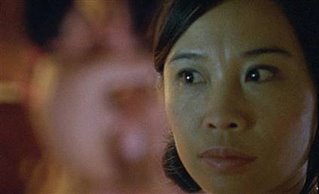 1. Shortbus - This utopian tale of troubled sexuality ranked top today because of its capacity to throw caution to the wind in its distinct brand of idealism. Resulting in a wholly vivacious and rambunctious offering, Shortbus shines with more heart than I can think of in any picture that I've seen in recent years. Oh, the film is flawed in a good many ways, but its decision to work against the grain of Hollywood's fashionable nihilism, instead creating a sexual fairytale landscape (though one not naive to its bleak surroundings), is truly compelling.
1. Shortbus - This utopian tale of troubled sexuality ranked top today because of its capacity to throw caution to the wind in its distinct brand of idealism. Resulting in a wholly vivacious and rambunctious offering, Shortbus shines with more heart than I can think of in any picture that I've seen in recent years. Oh, the film is flawed in a good many ways, but its decision to work against the grain of Hollywood's fashionable nihilism, instead creating a sexual fairytale landscape (though one not naive to its bleak surroundings), is truly compelling.
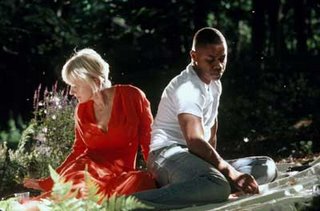 2. Shadowboxer - Brilliant for its inadequacies, Shadowboxer proved my most memorable theatrical outing of the year. I'm hard pressed to think of a single moment of the film which could be read as plausible. The film follows Helen Mirren and Cuba Gooding Jr. as an assassin duo of lovers. Mirren's dying of cancer, and when, on what is to be her final hit, an opportunity at religious redemption lands in her lap, she accepts it with that straight face only Mirren is capable of. Gracious support is to be found in one of the most varied motley crew of actors: Monique, Joseph Gordon-Levitt, Stephen Dorff and the inimitable Macy Gray make the film an absolute delight as they stumble about, all too game, and unsure of their purpose in the film at hand.
2. Shadowboxer - Brilliant for its inadequacies, Shadowboxer proved my most memorable theatrical outing of the year. I'm hard pressed to think of a single moment of the film which could be read as plausible. The film follows Helen Mirren and Cuba Gooding Jr. as an assassin duo of lovers. Mirren's dying of cancer, and when, on what is to be her final hit, an opportunity at religious redemption lands in her lap, she accepts it with that straight face only Mirren is capable of. Gracious support is to be found in one of the most varied motley crew of actors: Monique, Joseph Gordon-Levitt, Stephen Dorff and the inimitable Macy Gray make the film an absolute delight as they stumble about, all too game, and unsure of their purpose in the film at hand.
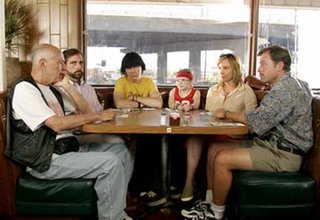 3. Little Miss Sunshine - Perhaps the only major studio offering which didn't purport more than it could possibly deliver, Little Miss Sunshine's existential slightness worked to its best advantage. For what other fun summer romps can you think of which take stabs at Proust, Nietzsche, 12 Step Programs, adolescent beauty pageantry and sexuality in America without seeming heavy handed? Taking its quiet cues from perhaps more complicated 70's fare, Little Miss Sunshine is no grand work of cinema, but is so much the better for never masquerading as such. Though the perfect cast (what's more, with perfect chemistry) is rounded out by a comic great like Alan Arkin and an underused Toni Colette (reminding the world of her impeccable comedic chops), introducing Abigail Breslin and giving Paul Dano a first mature moment in the sun, the real show-stealer is the agonizing downfall of Steve Carrell as the suicidal number one... oops, make that number two Proust scholar in America. Now that's comedy.
3. Little Miss Sunshine - Perhaps the only major studio offering which didn't purport more than it could possibly deliver, Little Miss Sunshine's existential slightness worked to its best advantage. For what other fun summer romps can you think of which take stabs at Proust, Nietzsche, 12 Step Programs, adolescent beauty pageantry and sexuality in America without seeming heavy handed? Taking its quiet cues from perhaps more complicated 70's fare, Little Miss Sunshine is no grand work of cinema, but is so much the better for never masquerading as such. Though the perfect cast (what's more, with perfect chemistry) is rounded out by a comic great like Alan Arkin and an underused Toni Colette (reminding the world of her impeccable comedic chops), introducing Abigail Breslin and giving Paul Dano a first mature moment in the sun, the real show-stealer is the agonizing downfall of Steve Carrell as the suicidal number one... oops, make that number two Proust scholar in America. Now that's comedy.
 4. Somersault - Doing a theatrical run in the United States practically undetected, Somersault is a whisper-quiet Australian coming of age film. Perhaps best known as introducing Miss Abby I-Broke-Up-Reese-and-Ryan Cornish, it should be better recognized as a sensitive and lyrical portrait of an aimless girl. Having been caught kissing her mother's boyfriend, Heidi escapes to an off season ski resort and takes a job as a gas station clerk. Of course there's all sorts of teenage anguish brewing, but its rendered in the most exquisite and sensitive of lights. Somersault achieves the absurdly rare feat of depicting character development and maturity at its most painfully plausible. If Cornish will just stay out of the tabloids long enough to make a picture, we might have a shining future starting here...
4. Somersault - Doing a theatrical run in the United States practically undetected, Somersault is a whisper-quiet Australian coming of age film. Perhaps best known as introducing Miss Abby I-Broke-Up-Reese-and-Ryan Cornish, it should be better recognized as a sensitive and lyrical portrait of an aimless girl. Having been caught kissing her mother's boyfriend, Heidi escapes to an off season ski resort and takes a job as a gas station clerk. Of course there's all sorts of teenage anguish brewing, but its rendered in the most exquisite and sensitive of lights. Somersault achieves the absurdly rare feat of depicting character development and maturity at its most painfully plausible. If Cornish will just stay out of the tabloids long enough to make a picture, we might have a shining future starting here...

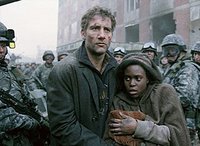 5. Children of Men and Pan's Labyrinth - Both films herald the same dystopic distrust of humanity, yet are still absolutely enamored with mankind's potential for good. Where Pan's Labyrinth locates its macabre fairytale in the recent past of Franco's occupation, Children of Men finds itself ruminating on the end of fertility in the not-too-distant future. Both take great care in showing man's potential for absolute devastation (with the most unwavering depiction of brutality) yet nurture the same dream that we might become selfless and devote ourselves to a greater good. Where Children of Men's optimism is a tad syrupy, Pan's Labyrinth is necessarily steeped in it. Both must also be applauded for their sobriety in the face of their escapist genre trappings. These are the best examples of social commentary around.
5. Children of Men and Pan's Labyrinth - Both films herald the same dystopic distrust of humanity, yet are still absolutely enamored with mankind's potential for good. Where Pan's Labyrinth locates its macabre fairytale in the recent past of Franco's occupation, Children of Men finds itself ruminating on the end of fertility in the not-too-distant future. Both take great care in showing man's potential for absolute devastation (with the most unwavering depiction of brutality) yet nurture the same dream that we might become selfless and devote ourselves to a greater good. Where Children of Men's optimism is a tad syrupy, Pan's Labyrinth is necessarily steeped in it. Both must also be applauded for their sobriety in the face of their escapist genre trappings. These are the best examples of social commentary around.
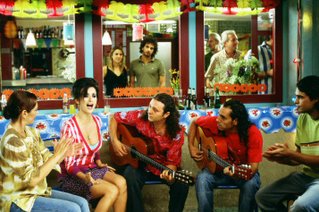 6. Volver - Will Pedro ever stop? Of course, the answer Should be 'Please, God, no!' But really, what other director churns out such cohesive gems with such regularity? This time around, we are treated to a world which has completely washed its hands of the male sex. This sturdy understanding which Almodovar has for the Women's Movie is as reifying yet as dismantling as, say, Altman's approach to the Western in McCabe and Mrs. Miller. His direction of Cruz is nothing short of majestic - yet the real pleasure here is watching Almadovar and Carmen Maura play off one another. Her's is a subdued character, but never has subdued been so alive and fulfilling.
6. Volver - Will Pedro ever stop? Of course, the answer Should be 'Please, God, no!' But really, what other director churns out such cohesive gems with such regularity? This time around, we are treated to a world which has completely washed its hands of the male sex. This sturdy understanding which Almodovar has for the Women's Movie is as reifying yet as dismantling as, say, Altman's approach to the Western in McCabe and Mrs. Miller. His direction of Cruz is nothing short of majestic - yet the real pleasure here is watching Almadovar and Carmen Maura play off one another. Her's is a subdued character, but never has subdued been so alive and fulfilling.
 7. Brothers Of The Head - Another picture which slunk by the general public in theaters, earning IFC films a mortifying mere $44,000, this alleged documentary is one of the last great loveletters to Film as a medium. Like last year's Last Days, Brothers works with the quality of film itself, considering its materiality aesthetically. In the best of moments, its pure bliss; like early photography's movement of Pictorialism, the grainy filmstock, which presents itself as having been plucked from the seventies, captures its surprisingly complex subjects (which are two conjoined twins, signed to a novelty label, who rebel and record a Punk record) with a sumptuous ambiguity. The film oscillates from remarkably complex to dangerously simplistic, yet ultimately comes out on top - thanks to spot-on performances by the twin leads.
7. Brothers Of The Head - Another picture which slunk by the general public in theaters, earning IFC films a mortifying mere $44,000, this alleged documentary is one of the last great loveletters to Film as a medium. Like last year's Last Days, Brothers works with the quality of film itself, considering its materiality aesthetically. In the best of moments, its pure bliss; like early photography's movement of Pictorialism, the grainy filmstock, which presents itself as having been plucked from the seventies, captures its surprisingly complex subjects (which are two conjoined twins, signed to a novelty label, who rebel and record a Punk record) with a sumptuous ambiguity. The film oscillates from remarkably complex to dangerously simplistic, yet ultimately comes out on top - thanks to spot-on performances by the twin leads.
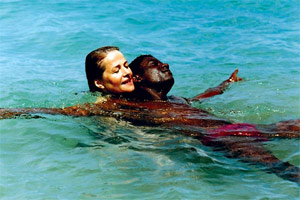 8. Heading South (Vers Le Sud) - Nothing short of nasty, this vicious account of sexual vacationing states best its intentions in its female leads' voracious glances. A battle of wills is set into place when Brenda (Karen Young) vies for more amorous affections with a particular Haitian native than the mere sexual ones which the other women so desire. Her arch rival is the implacable Charlotte Rampling, who is not willing to give up her favorite "boy" without a fight. And though the other women claim mere sexual want, as the film progresses, their predatory demeanors begin to crumble and the social implications came plainfully into broad daylight. Vers Le Sud says quite beautifully what Lars Von Trier aimed to force in this year's (mostly)disappointing Manderlay.
8. Heading South (Vers Le Sud) - Nothing short of nasty, this vicious account of sexual vacationing states best its intentions in its female leads' voracious glances. A battle of wills is set into place when Brenda (Karen Young) vies for more amorous affections with a particular Haitian native than the mere sexual ones which the other women so desire. Her arch rival is the implacable Charlotte Rampling, who is not willing to give up her favorite "boy" without a fight. And though the other women claim mere sexual want, as the film progresses, their predatory demeanors begin to crumble and the social implications came plainfully into broad daylight. Vers Le Sud says quite beautifully what Lars Von Trier aimed to force in this year's (mostly)disappointing Manderlay.
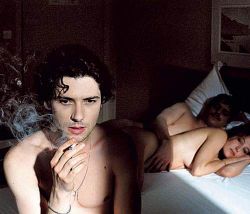 9. Time To Leave (Le Temps Qui Reste) - Where it might live in the shadow of his masterpiece, Under The Sand (Sous Le Sable), his second installment in a trilogy of coping with death, François Ozon's appreciation of the melodrama infuses weight and lyricism where there might have only been melancholy. The film's great stroke is its treatment of memory which comes in waves - equal parts reassurance and regret. Romain (Melvil Poupaud) is a successful fashion photographer who is diagnosed with terminal cancer. Jeanne Moreau arrives to lend an assured hand as Romain's grandmother and the magnificent Valeria Bruni-Tedeschi lends her mysterious and humbly sexual charisma. It is Ozon's now refined understanding of mise en scene and timing which lift the film above maudlin-fest 2006.
9. Time To Leave (Le Temps Qui Reste) - Where it might live in the shadow of his masterpiece, Under The Sand (Sous Le Sable), his second installment in a trilogy of coping with death, François Ozon's appreciation of the melodrama infuses weight and lyricism where there might have only been melancholy. The film's great stroke is its treatment of memory which comes in waves - equal parts reassurance and regret. Romain (Melvil Poupaud) is a successful fashion photographer who is diagnosed with terminal cancer. Jeanne Moreau arrives to lend an assured hand as Romain's grandmother and the magnificent Valeria Bruni-Tedeschi lends her mysterious and humbly sexual charisma. It is Ozon's now refined understanding of mise en scene and timing which lift the film above maudlin-fest 2006.
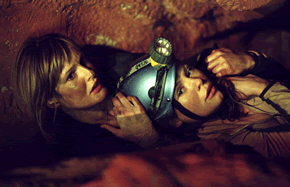 10. The Descent - Women. Cave. Not the subtlest of analogies, its true. But I've been itching for a good ol' horror movie for quite some time. Hyped out the ass, it arrived this year in the form of The Descent. This time, however, the film lived up to its claim, though not because of the nasty beasties who are to be the film's primary horror, but for (a) the film's first half of beasty-free harrowing spelunking and (b) director Neil Marshall's fear of female deception. Our 6 sporty ladies dip into an uncharted cave and become trapped in the oh-so-tight crevices. For anyone even remotely claustrophobic (me) the film is a nightmare. But wait, there's a whole backstory of marital deception and petty competition. Even when the beasties do show up, the insane use of frantic editing during the girls-fight-back sequences is positively squirm inducing in its confused torture of who's maming who?
10. The Descent - Women. Cave. Not the subtlest of analogies, its true. But I've been itching for a good ol' horror movie for quite some time. Hyped out the ass, it arrived this year in the form of The Descent. This time, however, the film lived up to its claim, though not because of the nasty beasties who are to be the film's primary horror, but for (a) the film's first half of beasty-free harrowing spelunking and (b) director Neil Marshall's fear of female deception. Our 6 sporty ladies dip into an uncharted cave and become trapped in the oh-so-tight crevices. For anyone even remotely claustrophobic (me) the film is a nightmare. But wait, there's a whole backstory of marital deception and petty competition. Even when the beasties do show up, the insane use of frantic editing during the girls-fight-back sequences is positively squirm inducing in its confused torture of who's maming who?
And a few for the shortlist: The Intruder, 20 Centimeters and Gabrielle.

7 Comments:
Interesting list. Somersault was an interesting inclusion. I liked in back in 2004 and I just rewatched it. It's still pretty good. Abbie Cornish also has Candy, so I think she's proving to be a talent. At least on screen. She has no personality off screen.
I liked your list in spite of the fact I've watched only Volver and Little Miss Sunshine from it, but it's formed with movies I'm longing to see but I'm sure my lovely country will never have; at least not on the theatres. I hope I watch Shortbus and Le Temps Qui Rest on DVD, I hope it actually gets here.
will there be a worst of the year list too?
A worst of the year list for 2006? Darling, there's not enough time in the world...
wow...i haven't seen brothers of the head on anyone's list.
Like you list.
Keep up the good work.
Post a Comment
<< Home